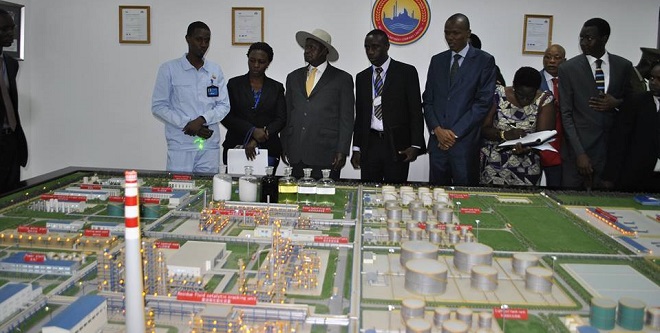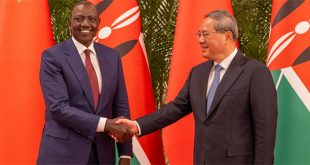
Indeed, Uganda has in the past suffered fuel shortages leading to price hikes and in 2007, the country was cut off from the supply of petroleum products due to riots that rocked Kenya following a disputed election.
A study done by international company, Foster Wheeler, found that a refinery was financially viable.
Besides, officials say the demand for petroleum products in the region keeps growing at over 7%.
Kenya’s refinery at Mombasa, which critics have in the past pointed to as another reason Uganda doesn’t need a refinery, is very old and inefficient.
The refinery has also featured prominently on the agenda of President Museveni’s trips to Iran, Russia and South Korea. Perhaps the most recent sign of Museveni’s interest in the refinery was in August this year. On his trip to Chad to attend the swearing-in ceremony of President Idriss Debby, who had just been re-elected, Museveni went with petroleum engineers, Irene Batebe and refinery engineer Benjamin Ariho.
While there and in the company of Chad’s minister of Petroleum, Mines and Energy, Mr Djérassem Le Bémadjiel and Ugandan engineers, he was was flown to tour Chadi’s $ 4 billion Djarmaya Oil Refinery moments after arrival in N’Djamena, the country’s capital.
Tough times bite
So for the pro-refinery group, it is seen as “an anchor for Uganda’s oil industry” for which money must be got.
But if there was a time when raising US$500 million was tough but doable for Museveni, now it looks impossible.
Way back in 2013, four major players had expressed interest in the refinery. They included; China Petroleum Pipeline Bureau (CPPB), Marubeni Corporation from Japan, RT–Global Resources from Russia, and SK Group from South Korea. UAE’s PETROFAC and VITOL SA from Switzerland expressed interest but did not put in bids. The other four bid.
At the time, the technocrats at Energy and Finance were feted by the investors as President Museveni strategised to squeeze the best deal out the competing interests.
The quick development of the refinery appeared on course with government securing some 29 sq miles of land in Kabaale, Hoima district after moving 7,118 locals who previously occupied it.
At the time, Russia’s Deputy Foreign Minister Gennady Gatilov visited Kampala and held talks with President Museveni.
South Korea’s then ambassador Park Jong-Dae told The Independent that experts from SK Group were in town at the invitation of President Museveni and appeared hopeful that the consortium would win the contract.
Russia’s RT–Global Resources General Director, Andrey Korobov, assured Museveni that the company had already lined up about US$ 1 billion for the project. Its partners, VTB Capital Plc, were expected to bring the funds and Tatneft to do the engineering work.
In the end, the Russian and South Korean consortia were picked as lead bidder and alternate bidder respectively.
A senior government official who was involved in the negotiations that followed said that at first the problem for the South Koreans was that they did not have money.
“The deal breaker for the South Koreans was money,” the official said on conditions of anonymity, “they wanted to invest only 30 percent of the money yet government was looking for an investor that would invest 60 percent and the Russians were ready to do this.”
 The Independent Uganda: You get the Truth we Pay the Price
The Independent Uganda: You get the Truth we Pay the Price




 New 30km speed limit for urban areas now in full force
New 30km speed limit for urban areas now in full force